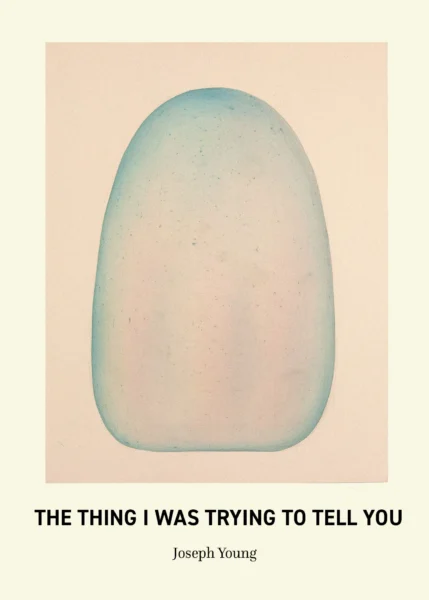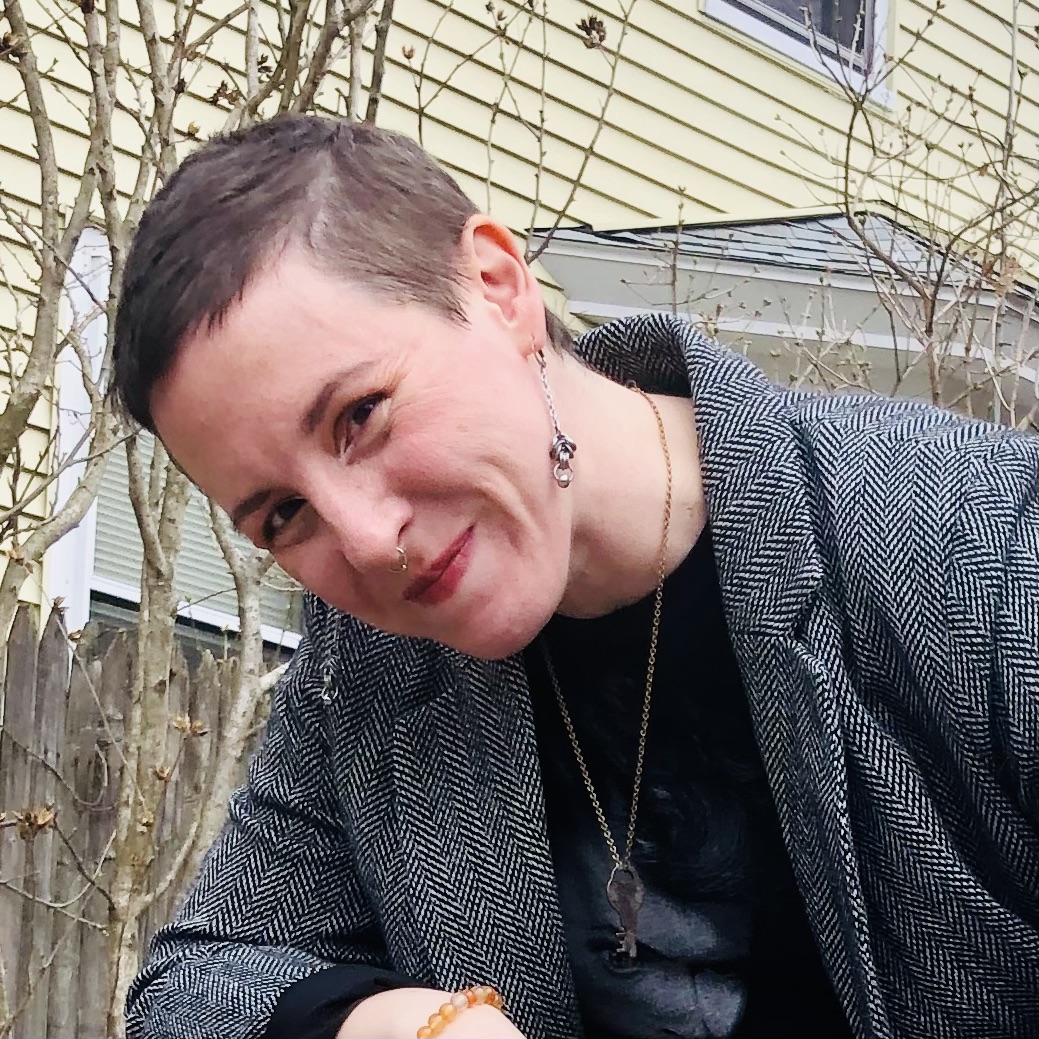
Reviewed by Erin Vachon
An elephant sits in an attic. Downstairs someone attempts to say “I love you” to their lover. You want to find the meaning here. But “this elephant is not a metaphor…She – as god or the empty stars allow – is her own elephant outright.” Throughout Joseph Young’s new micro collection, The Thing I Was Trying To Tell You, the animals refuse our emotional baggage, including well-crafted metaphors. Over 62 very short fiction and found prose pieces, Young logs human behavior as if we were unusual creatures worth studying. As for the elephant: well. Leave her out of it, please.
Young remains amused by humans and their communication. His collection is a zoo of crisscrossing connections, mostly failures. By contrast, the animals are beyond capable: near superhuman. In a character’s TV show pitch, two deer run through the woods. The “deer were telepathic of course and though they were running from a hunter, they had a long, silent discussion about human ontology, which neither deer is sure we have.” Humans moon over our humanity, which might mean nothing at all. We cannot seem to get out of our own way. Deer, on the other hand, can mind meld.
But then, we’re stuck in our own heads. Every teacher can only speak through their specialty in “Orientation”: “Math, said his math teacher, is everywhere. Everything you can think about comes back to math.” But the teachers cannot hear each other. “Once you see it, said his science teacher, you can’t unsee it – science is the language of life, the planets, even love.” Meanwhile, Young’s animals chatter their own language, teachers in their own right: “He played with his dog. Dog dog dog, said the dog. He pet his cat. Cat cat cat.” Except when everyone falls silent, Young’s universe confounds all description: “He smiled and laughed – until he saw the moon in his window. Where the sun that lit its face? Where the sea its gravity pulled?”
Young’s characters expand when they aspire to “animal consciousness,” and fuck like a “horse, dentist, waitress, tuna fish in love.” In “New Metaphors in Flash Fiction,” he states outright: “let’s disremember our character.” He allows his characters to be nothing, besides suffering slightly in the present. “Markus was not reading, since then in his life he had no interest in books. His friends talked about Camus and Camus and Camus, and Weil, but he hadn’t a clue what they wrote.” Young’s disremembering verges on the Absurd, humans squirming in a snow globe, shaken by their author.
If the characters cannot communicate well, they wish they could. They create meaning in gaps of understanding. In “Like Dark,” a narrator pouts in infantile gestures as a lover’s anger escalates, until “All I can think of is to sit perfectly still and imagine the edge of the universe flaking off like pie crust, hope she can see the mystery of it in my eyes.” What could be more beautiful, believing someone sees the sweet dessert filling of your soul, not one word exchanged?
Of course, you cannot know if someone truly sees you. So Young often ends flash with a held breath, or a slow deflation, even a refusal to budge. Nature steals the last word. If “the world was a shining bomb,” the explosive ending sizzles in the space before detonation. A lit fuse, left fizzling.
Yet Young’s narrative speed is a realization of how little time we have compared to nature. In an accretion of Wikipedia blurbs, Young documents performers from professional wrestlers to magicians who died from heart attacks. The result flattens their identities, every person lost to their final commonality: death. If we all must face Nature and Wikipedia in the end, what chance does any human have?
As antidote to disillusionment, Young gets weird.
His style celebrates our strange animal bodies, transmuting the world with sound that’s unself-conscious and strange. “The Paintings of Forrest Bess” is a playful ekphrastic experiment through micro: “I think we can tell you 5 things: that the sea spins, that the god will die, that the wires of the head shall sing, that an old man takes breath, that we look to see the enveloped beauty of souls.” He dances the language of cat-cat and dog-dog, changing how we listen.
The same poetics carve the repetitive slog of routine in “Work.” “Fuck, dude” is refrain to a watchful dog, a potato chip on a carpet, a guy tapping on a computer, a slim slice of sun. Nothing happens, in the steady manner of work. What’s captured on the page refuses straight-shot velocity toward an ending, but makes a self-looping engine instead. Personal and ancestral history layer in similar repetition in “The Pants.” The narrator’s father remembers “a boy he knew a boy whose pants caught fire,” with “the pink sky on fire as well,” a story the father retells his boy against cycles of “the shush of the waves,” waves which crash again and again. Nature breaks apart the father’s story with insistent hush, truths broken wide open. Young centers sound over plot, and creates plot by looping sound, a dog chasing its tail. This is the joy, perhaps. The deer mind meld of it all: poetry. Carrying ourselves across history with language that thinks outside ourselves, disremembers.
In the end, Young’s flash argues for the necessity of storytelling, and its retelling. Empathy requires imagination, seeing by stretching outside the self: “Can you imagine that? Can you see that small child seeing one of those things?” Still, Young’s characters fail to understand each other, time and again. Storytelling is always, at best, a silly attempt to connect. But we have to keep trying anyway. As Young writes: “Try very hard. In that way, you’ll see what I’ve been trying to tell you.”
Joseph Young’s The Thing I Was Trying to Tell You (158 pp.) is available from Publishing Genius.
_________________________
 Erin Vachon’s writing appears in Black Warrior Review, SmokeLong Quarterly, DIAGRAM, Hayden’s Ferry Review, and Brevity, among others. They are a Submissions Editor at SmokeLong Quarterly, 2023 Writer-in-Residence at Linden Place, and a 2023 Recipient of the SmokeLong Fellowship for Emerging Writers. Their work has been featured in the Wigleaf Top 50, and nominated for the Pushcart, Best Small Fictions, Best of Net, and Best Microfictions.
Erin Vachon’s writing appears in Black Warrior Review, SmokeLong Quarterly, DIAGRAM, Hayden’s Ferry Review, and Brevity, among others. They are a Submissions Editor at SmokeLong Quarterly, 2023 Writer-in-Residence at Linden Place, and a 2023 Recipient of the SmokeLong Fellowship for Emerging Writers. Their work has been featured in the Wigleaf Top 50, and nominated for the Pushcart, Best Small Fictions, Best of Net, and Best Microfictions.

 The core workshop of SmokeLong Fitness is all in writing, so you can take part from anywhere at anytime. We are excited about creating a supportive, consistent and structured environment for flash writers to work on their craft in a community. We are thrilled and proud to say that our workshop participants have won, placed, or been listed in every major flash competition. Community works.
The core workshop of SmokeLong Fitness is all in writing, so you can take part from anywhere at anytime. We are excited about creating a supportive, consistent and structured environment for flash writers to work on their craft in a community. We are thrilled and proud to say that our workshop participants have won, placed, or been listed in every major flash competition. Community works.